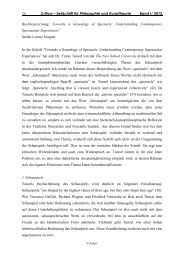Band I/ 2013 (6,7mb) - critica – zeitschrift für philosophie ...
Band I/ 2013 (6,7mb) - critica – zeitschrift für philosophie ...
Band I/ 2013 (6,7mb) - critica – zeitschrift für philosophie ...
Erfolgreiche ePaper selbst erstellen
Machen Sie aus Ihren PDF Publikationen ein blätterbares Flipbook mit unserer einzigartigen Google optimierten e-Paper Software.
49 CRITICA<strong>–</strong>ZPK I | 13<br />
up or implies, Durkheim, though, never expressly<br />
purports) then the concept must collapse because<br />
the complementary agents of consciousness fall<br />
apart and subjective consciousness would possess<br />
a real opportunity to retain and be absolutely for<br />
itself. To the contrary, when consciousness has the<br />
capability to collect several, innumerous individuals<br />
in order to share immediately, without the help<br />
of language or other additional signs they may be<br />
coded or not, a common and focussed experience<br />
that may include the exhibition of a special affect,<br />
a drama and intercourse relying upon, then<br />
consciousness should (i) be interconnected from<br />
the beginning (i.e. by nature, properly as its first<br />
‘innatum’ or inborn essence, contrary to the eventual<br />
ideas, and probably even more than only to<br />
hundred percent in the sense of an ‘accomplished’<br />
manifest token at a given time, so that it both has<br />
to provide insight into the very root and the general<br />
condition of consciousness as well); and (ii)<br />
should virtually exist as one real, connected entity<br />
without entailing any natural gap, lacuna or interruption<br />
ever, unless representation, personal abstraction<br />
and interference, proper reflection is responsible<br />
for, focussing the self at the same time;<br />
this altogether against (iii) any presumption that<br />
the same individuals come together, then stick to<br />
their consciousness in order to connect and weave<br />
it all over (still in the primordial, constitutive<br />
sense) allowing the common affect to be shared<br />
<strong>–</strong> which would be a mechanical-like description<br />
without any substantial understanding of polarity<br />
and the real energy consciousness must consume<br />
and consummate.<br />
To the extent, concerning the meaning of music,<br />
of collective emotion and even consciousness, one<br />
part has been introduced that is depending upon<br />
actual exhibition or a rehearsal. Furthermore, it<br />
may be the case that it is very well exhibiting the<br />
expression of a peculiar subject, singing on the<br />
stage, whereby the whole audience is attuned to it<br />
and assembled by one common emotion, its perception<br />
and adhering representations. The very<br />
question, however, is whether that same expression<br />
should not be and perform the expression of<br />
a community, of a subjectivity that is collective in order<br />
to convey its essence from this peculiar point of view. On<br />
a large scale of historical points of possible liaison<br />
(beginning with the concept of the author’s refusal<br />
to make himself manifest; then passing over to<br />
music history and the upcoming of the monody<br />
and the concerto principle, where the individualistic<br />
standpoint in contrast to and interference<br />
with the tutti is obligatory), three authors from<br />
the nineteenth century seem especially worth<br />
to be cited <strong>–</strong> (i) Schopenhauer, (ii) Wagner, and<br />
(iii) Goethe, authors well known in their opinion<br />
which now may be read and construed from another<br />
side. The final light will be cast on Goethe’s<br />
relationship to music where the main effort is to<br />
understand how it comprises fusion, or not, which<br />
might also be understood as comprehensing the<br />
translation of a poem or even a theatre play into<br />
music, musical expression.<br />
1. Beginning with Schopenhauer, he purported<br />
that “die Musik ist nämlich eine so unmittelbare<br />
Objektivation und Abbild des ganzen Willens, wie<br />
die Welt selbst es ist, ja wie die Ideen es sind, deren<br />
vielfältige Erscheinung die Welt der einzelnen<br />
Dinge ausmacht. Die Musik ist also keineswegs,<br />
gleich den anderen Künsten, das Abbild der Ideen;<br />
sondern Abbild des Willens selbst, dessen Objektität<br />
auch die Ideen sind: deshalb ist eben die<br />
Wirkung der Musik so sehr viel mächtiger und eindringlicher,<br />
als die der anderen Künste: denn diese<br />
reden nur vom Schatten, sie aber vom Wesen.“ 25<br />
There is no mention of consciousness, even not of<br />
collective consciousness in this famous passage.<br />
Nevertheless, it is closely related, as soon as one<br />
investigates into the underlying relation of individuality<br />
and its counterpart which, still not subject<br />
to the principium individuationis, Schopenhauer<br />
always names the “Wesen” or original will. As it is<br />
not transferred into particularization and expression<br />
by the ideas (well in the Platonic sense) it still<br />
must comprise a peculiar interconnectedness, an<br />
intermediate interwoveness, specific density and<br />
fusion, relying upon the entire, still non-separated<br />
entity (standing, except of Spinoza, totally in opposition<br />
to the concept of substance holding this<br />
25 Artur Schopenhauer, Die Welt als Wille und<br />
Vorstellung. In: Sämtliche Werke. Textkritisch<br />
bearbeitet und herausgegeben von Wolfgang Frhr. Von<br />
Löhneisen. <strong>Band</strong> I, Frankfurt 1968, p.359.




